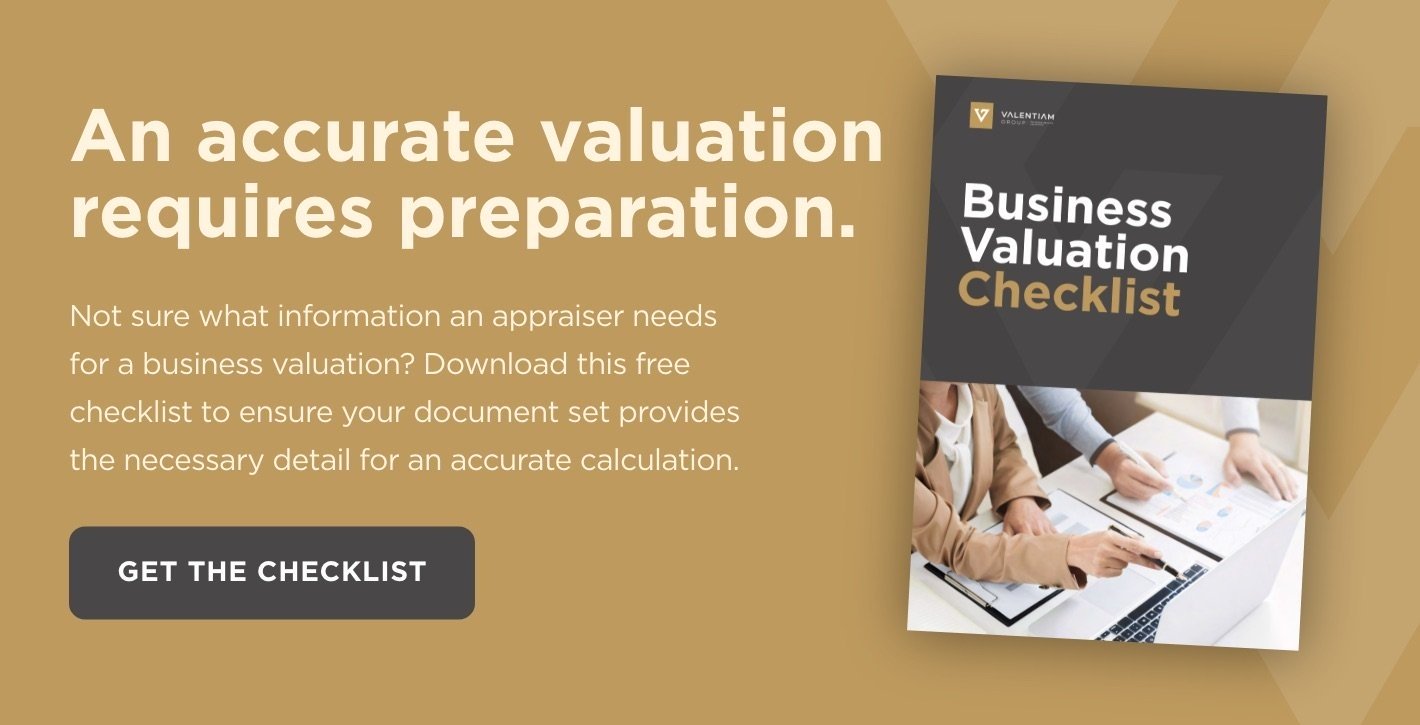How To Select A Business Valuation Expert
Posted by Valentiam Group on October 10, 2020

For determining accurate values for business assets, the services of a business valuation expert are advised. Whether the valuation is needed for a transaction or for tax purposes, a professional business valuation establishes a value that is both accurate and defensible.
It’s important to understand, however, that not all experts have similar business valuation credentials or experience. As in other professions, many business appraisers have areas of specific expertise. In this article, we’ll examine the various business valuation qualifications and areas of valuation experience you should consider when seeking the services of a business valuation expert.
Download our free Business Valuation Checklist to learn about the information needed to calculate an accurate value for your business.
What To Look For In A Business Valuation Expert
There are two main considerations to take into account when hiring a business valuation expert: credentials and experience.
Business Valuation Credentials
To evaluate whether a business appraiser is the right fit for your specific needs, first consider his or her educational credentials. Where did the appraiser study, and what did they study related to finance and valuation?
Becoming a certified business valuation expert requires additional study beyond a four-year college degree, as well as valuation experience. There are three designations for business appraisers which reflect levels of training and expertise:
Accredited Senior Appraiser (ASA)
The highest level of accreditation, the ASA is awarded through The American Society of Appraisers. Experts are required to complete over 120 hours of education and pass multiple tests—in addition to having five years of full-time business valuation experience—to earn the ASA designation. ASA candidates are also required to submit a valuation report for a peer review process. The ASA credential is entirely focused on business valuation.
Appraisers with ASA certification are subject to a mandatory re-accreditation process every five years. Re-certification requires proof of continuing education and professional growth.
Chartered Financial Analyst (CFA)
CFA accreditation is issued through the CFA Institute. It is also a rigorous course of study, but it goes beyond business valuation and includes portfolio management and other areas of valuation and finance.
To earn the CFA designation, appraisers must pass three levels of the CFA exam, each requiring around 300 hours of study—a process that requires a minimum of 18 months to complete, assuming the candidate passes each exam in succession. Pass rates for the exams are low (around 50%), and the exams for Levels II and III are administered only once per year, so the process can take several years longer. In addition, the CFA designation requires submission of professional references and four years of full-time industry experience.
Certified Valuation Analyst (CVA)
CVA credentials are granted by the National Association of Certified Valuators and Analysts (NACVA). To be eligible for CVA certification, candidates must be a certified public accountant (CPA) in good standing or hold a business degree, apply for membership in NACVA (or pay a CVA designation fee), pass the CVA exam, and submit a business valuation report for peer review. Candidates must also have substantial experience in business valuation. This experience may be any of the following:
- Two or more years of full-time or equivalent experience in business valuation.
- A minimum of 10 valuations where the candidate played a significant role in performing the valuation.
- Ability to demonstrate substantial knowledge of business valuation practices and methodologies.
In addition, to maintain the CVA credential, appraisers must pay NACVA membership fees or CVA renewal fees, and complete at least 36 hours of continuing education credits every three years.
Valuation Experience
After establishing the business valuation expert’s credentials, evaluate their experience. Is the expert a generalist or a specialist? What is their area of specialty?
The appraiser’s area of expertise is particularly important. An appraiser may hold an ASA designation—the gold standard for business valuation—but if you are seeking an appraiser for portfolio valuation, for example, an expert with a different certification might be a better fit.
When evaluating the valuation expert’s experience, make sure it aligns with your needs. Each type of valuation analysis has aspects you need to consider. Different types of valuations call for expertise in one or more of the three basic valuation approaches: the market, income, and cost approaches. The following are the different types of business valuations, and the valuation methods used for each:
Merger & Acquisition (M&A) Valuation
For mergers and acquisitions, you will want an appraiser with a lot of experience performing valuations for M&A transactions. M&A valuations rely more heavily on the market approach than valuations for other types of transactions. The market approach, which estimates business value based on data from similar companies and transactions, provides an estimate of value which may be all that is required in an M&A transaction. In these types of transactions, the acquiring company is often less concerned with establishing a more precise value because it will realize profitable synergies from the acquisition. For most other purposes, a more definitive valuation is required, and an expert experienced in the income and cost approaches will be a better fit.
Portfolio Valuation
Portfolio valuation also typically utilizes the market approach in addition to the income approach. If you need valuation of a portfolio of assets, the expert you select should ideally have a lot of experience in this type of valuation—or at minimum, expertise in the application of both these valuation techniques.
Private Business Valuation
In cases involving private businesses—such as sales, partnership dissolutions, or divorces—the business valuation expert needs expertise in the valuation of private businesses, which poses a unique set of challenges. Because the financial information of private companies is more closely held and less transparent, the appraiser will often have more difficulty finding comparable businesses to use for application of the market approach, and will typically rely most heavily on the income approach.
Valuing a private business also requires that the appraiser be experienced in the application of discounts. Private business value is significantly impacted by several factors that are less significant in publicly-traded companies, and these are taken into consideration through the application of the following discounts:
- Marketability: This discount accounts for the fact that funds tied up in a private business are illiquid and the assets cannot quickly or easily be converted to cash.
- Lack of control: This discount applies when there are other owners of the business who must be consulted before making financial or operational decisions. A lack of control discount would apply in a case where a partner or LLC member sells his or her share of the business to another party, who will become a new partner or member. The lack of control discount adjusts value to account for the fact that the buyer will not have complete control of the business and therefore, will not have complete control over the fate of their investment.
- Key man: The key man discount is applied when the business’ value is significantly tied to a key employee. For example, if a small software development firm has one employee who is responsible for creating most of the company’s intellectual property, the value of the company would be diminished if that employee were to leave.
A business valuation expert with substantial experience in appraising private companies and private company assets will know which, if any, of these discounts should be applied, and how the discounts should be calculated.
Valuations For Tax Purposes
For a defensible valuation to challenge property tax assessments, you will want a business valuation expert who has familiarity with your industry. Property tax assessments range from the value of tangible assets to full business enterprise valuations. This requires an appraiser with a wide ranging experience in the industry, your company, and property tax laws.
Tax assessment challenges will be closely scrutinized by taxing authorities, so it’s crucial to present a professional business valuation compiled by a certified business valuation expert; a challenge that is not backed up with business valuation credentials is much less likely to prevail. Ideally, the appraiser you select should have substantial prior experience in successfully defending assessment challenges.
Regardless of your reason for seeking a business valuation, understanding the credentials and experience required for various types of valuations will help guide you to a business valuation expert who’s the right fit for your job. Selecting an appraiser with the credentials and specific experience pertinent to your needs will ensure you receive an accurate and defensible valuation of your business or business assets.
Need help determining the value of your business or business assets?
Valentiam has helped companies in a variety of industries attain accurate enterprise and asset valuations. We have extensive experience in the application of all valuation methods for a broad range of businesses and situations. Our valuation and transfer pricing specialists have worked with some of the largest companies in the world.
Contact us to see how we can help your company with your valuation and transfer pricing needs.
Topics: Business valuation
Related Posts
EBITDA Multiples By Industry: An Analysis
EBITDA multiples by industry indicate growth, profitability, and stability of profits in various sectors—and are a quick and easy way to estimate value.
Valuation Methods: A Guide
Different types of business valuation methods are suited to specific needs. Here are the three primary types of valuation techniques and when they should be used.


